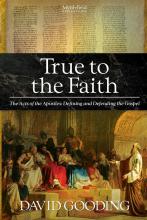
A little more from David Gooding’s book, True to the Faith.
Why is the section from Acts 19:21-28:31 so long, taking about a third of the book?
Because on trial is not just the question of whether Paul took a Gentile into the temple, but the gospel itself, and Paul as apostle to the Gentiles.
“They would also be weighing up his character and personality and sifting the reports of his past behaviour, with the result that the impression they formed of the gospel itself would be inseparably bound up with, and influenced by, their assessment of Paul himself. In that sense Paul was the gospel.
“Paul himself was of course aware of this; which is why he was not content simply to correct his accusers' version of what he had, and what he had not done in the temple. Positively and of his own initiative he chose twice to relate at length the story of his own conversion (22:1-21; 26:9-23); for the effect the gospel had had on his life and conduct, on his outlook, aspirations, goals and methods, was an integral and inescapable part of the defence of the gospel itself.
“Not only Paul but Luke as well was aware of this, so that his long and detailed descriptions of Paul's attitudes, reactions and general behaviour in many and varied situations during this period would have allowed Luke’s early readers — and still allow us — to watch Paul in action, to study his character and personality, to compare him with the other leading figures in the unfolding story, and so to draw their own conclusions about Paul.” (Page 341 in the 1990 edition)
Paul was charged of bringing a Gentile into the temple.
“But upon investigation, repeatedly made in the course of two enquiries and two trials, the charge proved unfounded and was dropped. But the intensity of the Jews’ animus against Paul continued unabated; and the Roman officials decided in the end that the real cause of it was, as Festus put it, ‘certain disputes about their own religion, and in particular about a man called Jesus who had died, but who Paul kept on claiming to be alive’ (25:19).
“With this we come to the heart of Paul’s defence of the gospel. From his very first appearance before the Sanhedrin in Jerusalem to his eventual meeting with the elders of the Jewish community in Rome, Paul insisted that the real issue at stake was not his own behaviour but the resurrection of Jesus. The real argument between Christianity and Judaism, even to this day, is not, in spite of all that is said, about who was ultimately responsible for Christ’s death. The real argument between them — and indeed between Christianity and all other religions and philosophies — is about whether Jesus, who died, really rose from the dead.” (Pages 343-4)
And a bit later on:
“Now Jesus had claimed to be that Messiah; and in order to destroy his claim the nation’s leaders had, ironically, seen to it that he died. Now they must at any cost deny that he had risen again. That was the real reason, according to Paul, why they were prosecuting him with such pertinacity and vigour; but in so doing they were denying what in fact was Israel’s most glorious hope, and trying to put out the light which that resurrection had shed over Israel and all the nations.”
Recent comments